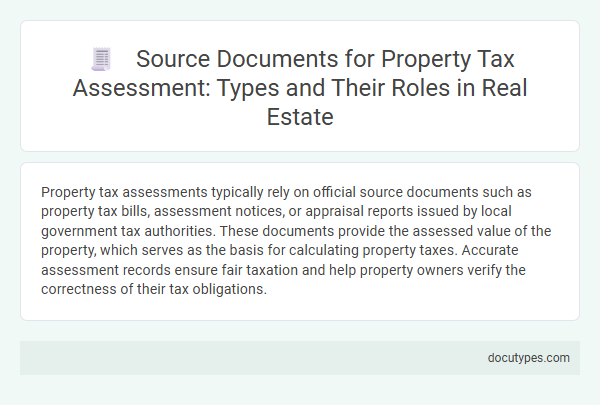Property tax assessments typically rely on official source documents such as property tax bills, assessment notices, or appraisal reports issued by local government tax authorities. These documents provide the assessed value of the property, which serves as the basis for calculating property taxes. Accurate assessment records ensure fair taxation and help property owners verify the correctness of their tax obligations.
Introduction to Property Tax Assessment
| Introduction to Property Tax Assessment |
|---|
| Property tax assessment is the process of determining the value of a property for taxation purposes. This value influences the amount of property tax owed by the owner. Accurate assessment ensures fair taxation and supports local government financing. |
| Source Documents Used for Property Tax Assessment |
| Key source documents include property deeds, which provide legal ownership details; recent sales data that offer market value insights; property appraisal reports prepared by licensed assessors; building permits showing improvements or changes; and tax records from previous assessments. These documents serve as primary references to establish the current taxable value. |
| Role of Source Documents |
| These documents ensure assessment accuracy by providing verified data on property characteristics, ownership, and market value trends. They help assessors apply assessment methods consistently and comply with local property tax regulations. |
Importance of Source Documents in Real Estate
Source documents play a critical role in the property tax assessment process by providing verified and detailed information about real estate. Accurate source documents ensure fair valuation and prevent disputes related to property taxes.
- Deed of Ownership - This document confirms the legal owner of the property and establishes ownership history essential for tax records.
- Property Appraisal Report - An expert assessment that details the current market value of the property, influencing the tax amount.
- Property Tax Bill - Official statements that record previous tax assessments and payments, helping verify ongoing tax obligations.
Your awareness of these source documents improves transparency and accuracy in property tax evaluations.
Deed Records: Establishing Legal Ownership
Deed records serve as a primary source document for property tax assessment by establishing legal ownership of a property. These records contain detailed information about the transfer of property rights between parties, ensuring accurate identification of property owners for tax purposes.
Tax assessors rely on deed records to verify ownership details, boundaries, and property descriptions essential for calculating property taxes. This documentation provides a legal basis to assess liabilities and resolve disputes related to property ownership. Maintaining up-to-date deed records is crucial for transparent and fair property tax administration.
Land Title Certificates and Their Relevance
Land Title Certificates serve as primary source documents for property tax assessment, providing official proof of ownership and detailed property boundaries. These certificates contain critical information such as parcel identification, owner details, and property description, which tax authorities use to determine accurate tax liabilities. Accurate land title records ensure proper valuation and prevent disputes during the property tax assessment process.
Role of Property Appraisal Reports
What type of source document is used for property tax assessment? Property appraisal reports serve as the primary source document in property tax assessments. These reports provide detailed evaluations of property value, which tax authorities use to determine accurate tax amounts.
What role does a property appraisal report play in tax assessment? The property appraisal report offers a comprehensive analysis of your property's market value, condition, and characteristics. This information forms the basis for fair and consistent property tax calculations by local governments.
Building Permits and Regulatory Approvals
Building permits serve as essential source documents for property tax assessment by providing verified information on new construction, renovations, or additions to a property. These permits help assessors determine the property's current value based on structural changes and improvements.
Regulatory approvals, including zoning clearances and environmental compliance certificates, further support the assessment process by confirming that property modifications meet legal and safety standards. Such documentation ensures accurate and fair valuation aligned with local property tax regulations.
Utility Bills as Supporting Evidence
Utility bills serve as essential supporting evidence in property tax assessments by verifying property usage and occupancy. These documents help assessors determine accurate property values based on real utility consumption.
- Verification of Occupancy - Utility bills provide proof that a property is occupied, which influences tax assessment decisions.
- Usage-Based Valuation - Electricity, water, and gas bills reflect actual usage, supporting more precise property valuation.
- Documentation Authenticity - Utility bills act as official records from service providers, adding credibility to the property tax assessment process.
Survey Maps and Property Boundaries
Survey maps play a crucial role as source documents in property tax assessment by providing detailed representations of property boundaries and land divisions. These maps help tax assessors accurately determine the size and location of parcels, ensuring precise valuation for tax purposes. Property boundaries defined in survey maps establish legal limits, preventing disputes and supporting fair taxation based on accurate land measurements.
Lease Agreements in Income Property Valuation
Lease agreements serve as critical source documents in property tax assessments, especially for income-producing properties. These agreements provide detailed rental income data that directly influence the valuation process.
- Document Function - Lease agreements establish the contractual rental terms, forming the basis for income calculations in property tax assessment.
- Income Evidence - The rental amounts and payment schedules outlined in leases reflect the property's potential revenue, essential for accurate valuation.
- Assessment Impact - Your property tax assessment relies on lease agreements to determine realistic income projections and ensure fair taxation.
What Type of Source Document Is Used for Property Tax Assessment? Infographic

